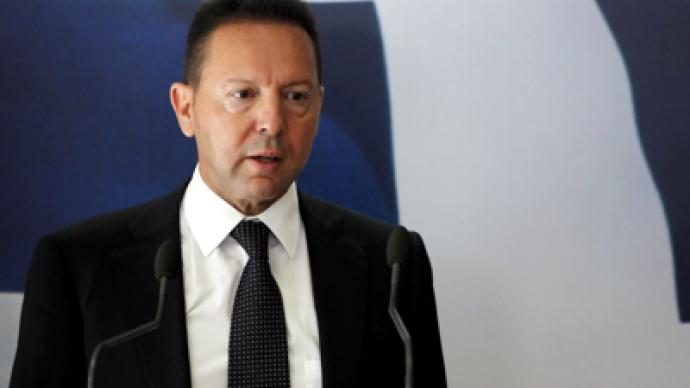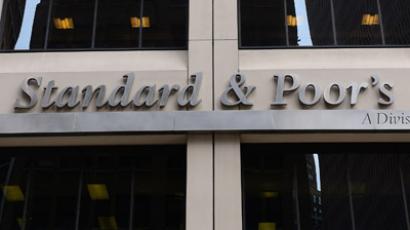Greek finance minister trumpets recovery in 2014

"The probability of Greece leaving the euro - Grexit - is now very small", says Yannis Stournaras, the Greek Finance Minister. His words come when anti-austerity protests are intensifying, with farmers due to strike following public transport.
"Towards the last quarter of 2013, we are going to have recovery," Stournaras told BBC News. "We have managed to turn the economy around. From the markets, there's much more optimism. Deposits are coming back to banks, the government is paying its arrears to the private sector and there is a change in how Europe sees us. So, all the leading indicators are positive. We are two-thirds of the way towards our target. So people can have hope," Stournaras added.The optimism comes at a time when general expectations for the Greek economy remain muted: analysts see its GDP contracting by about 4 – 4.3% in 2013, with a 2014 figure going down 2-3%.As real economic indicators remain dulled in Greece, analysts are skeptical about the bold announcement. “Optimism is a good and pleasant thing, though these announcements look quite funny in the wake of the current state of the Greek economy and its perspectives that are not that positive,” Anna Bodrova of Investcafe wrote in an e-mail.“Counting on the end of a recession in 2013 is still premature for the Athens, but doesn’t everybody have a right for hope?” Bodrova concluded. Unemployment in Greece now remains the highest in Europe – at 26.8%, with the debt level at a sky- high 180% of GDP. Under the game plan Greece is seeking to cut it to 124% of GDP by 2020, which is expected to be reached mostly through a massive austerity package passed last year.As for concrete measures that should help Greece realize its “economic miracle”, the Greek Finance Minister remained very diplomatic. "I would welcome a reduction of the level of debt – but there are many ways to achieve that", he said "but it should happen in a way that minimises the loss to other parties," Stournaras said.Past November Greece agreed to implement a set of severe measures, including tax hikes and a 25% cut in the minimum wages in the public sector, which is expected to save Greece up to $3 billion in 2013. After international creditors saw actual steps by Greece, they agreed to release another €34bn in bailout money to the crisis–stricken economy at the end of 2012. The European Central Bank (ECB) also kicked off a buy-out of sovereign bonds of eurozone countries to cut their yields and prevent sovereign defaults. This is smoothened analysts fears of Greece leaving the euro, with Olli Rehn, EU Commissioner saying in early January this year that “the danger of the eurozone’s split is over.”The measures have just disguised problems of the eurozone, with Greece, Spain and Portugal still likely to leave the currency bloc according to Russia’s ex- Finance Minister Aleksey Kudrin speaking at the World Economic Forum in Davos. “Nothing has been settled, everything has been postponed. The thing is that this time will give the opportunity to these countries to get their act together, consolidate and finally settle the problems. So far it hasn’t been the case,” Kudrin concluded.
What about people?
The people in Greece continue to demonstrate their anger at the sharp austerity package the country adopted last year. Most of the striking transport workers have ended their industrial action; farmers are expected to strike over changes in their tax status, the Guardian reports. Farmers are being “eradicated” by increased taxes and higher production costs, according to Kostas Lioliopoulos of the farmers union talking to the Guardian.“The economic crisis is killing us,” he said, adding that farmers from the region of Evros in the north to Crete in the south would wreak havoc if the governing coalition did not back down.“The country will be paralysed if there is no progress,” said Lioliopoulos.Electricity workers may also announce a strike, reports say.The country's main power company, the Public Power Corporation, will strike on Thursday in support of public transport employees who were forced back to work at the end of last week, The Guardian says.Public transport in Greece has been on strike for more than 10 days, with drivers ignoring a court ruling against the strikes. The court had ruled the strike, which stopped buses and trolleybuses in Athens, was illegal. The workers were protesting a cut in salaries, as well as show solidarity with the metro workers who terminated their nine-day protest last week after the government announced civil mobilization. Meanwhile Yannis Stournaras says it’s necessary to bit the bullet and live through 2013."If we implement this year's reform programme, there will be no more austerity packages", the Finance Minister told, "No more cuts in wages, benefits and pensions," the minister concluded.














